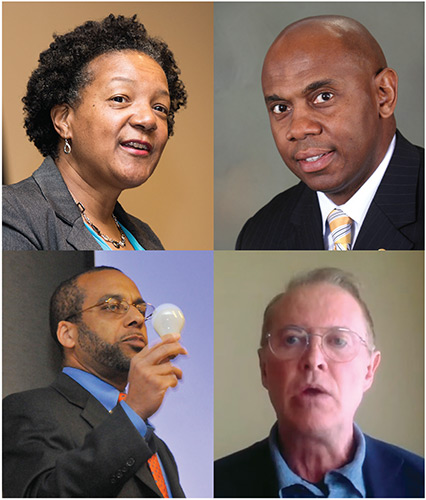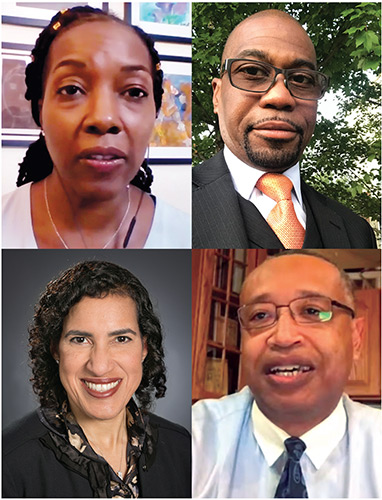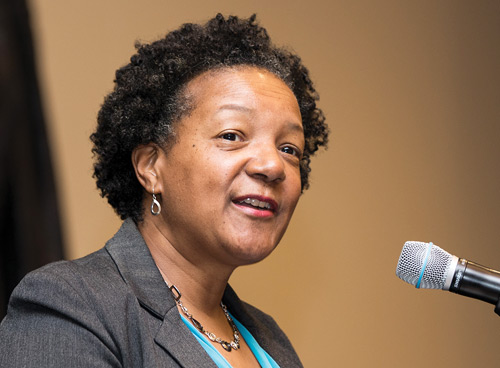AABE


The speaker list of American Association of Blacks in Energy events always excels. This is no more true than at AABE's annual policy summit and so it was in December. The 2020 summit three weeks ago featured leaders of utilities and utility regulators, of Congress, and the top energy associations. There was the chair of the House of Representatives' Energy and Power Subcommittee, a critically-important panel in all federal energy policymaking. There were execs from PSEG and Exelon, and commissioners from California and Pennsylvania. You get the idea. What follows is a taste of the many moments at this conference that matter to all of us in utility regulation and policy.
Brian Wolff, executive vice president for public policy and external affairs, Edison Electric Institute: We have an innovative program right now going on in Michigan that's with the Department of Corrections. It's a partnership with them, to be able to go and make sure that those folks have a pipeline to jobs. We're training on the facility grounds, and bringing them to our industry. I think that those are really the [kinds of] action that we're focused on. The outcomes that we're looking to achieve by doing those are promoting racial justice, and advancing the [diversity, equity and inclusion] progress at all levels.
Lori Traweek, chief operating officer, American Gas Association: As some of you know, there's a big push in some areas to eliminate natural gas under the guise of funding climate change solutions. That's strictly irresponsible. It doesn't make sense. That we need to together take a holistic approach as to finding that pathway where we're going to be able to get where we all want to be. We do believe that Joe Biden and Kamala Harris have an ambitious climate change agenda. We do too. They're also facing this financial crisis burdened by Covid. We can help. And we look forward to that honest engagement with the new administration that provides these solutions that can check all of the boxes. And we firmly believe that natural gas is part of that solution.
Curtis Wynn, CEO, Roanoke Electric Cooperative: Those who are most energy burdened are in many cases, low and moderate-income minority citizens who are living in rural areas. If you think that there was a big gap between the haves and have-nots for just something as simple as telephone service, or as sophisticated as Internet service today, the divide is going to get even wider. When you have a block of people who are left out of this transformation, that is a big concern for me. There has to be more coordination and more inclusiveness in this process. So that is, to me, a huge challenge that we work on every day at Roanoke, because of our demographics of the people we serve in the rural communities.
Rick Thigpen, senior vice president for corporate citizenship, PSEG: If you can forgive me for a New Jersey example. There are many young people left out of the economic opportunities in our society who live in Newark. What better way to give them economic opportunity, than to help train them to do energy efficiency projects in Newark. In lower-income communities, where sometimes some people would prefer not to be involved in those communities, others find that as a prime opportunity to enter the workforce, to do work that the economy needs as well as start themselves on new careers. So at Public Service of New Jersey we are very proud of a program we have. We recently have an energy efficiency program authorized by our [Board of Public Utilities]. That program we expect to create close to four thousand jobs.
Two thousand of those jobs are going to go through a clean energy future job training program. We are going to be purposely working with community organizations and underserved communities to identify potential candidates, to be trained for jobs, to do our energy efficiency program. Thereby you're winning for all. Your customer wins by having their utility bills decreased. The environment wins by having emissions decrease. And we are purposely stimulating economic opportunity in places that needed to meet that.
And then we're going to add one more piece to that, which is we're also going to be purposeful about making sure that the business opportunities are distributed to minority women-owned, veteran-owned and other disadvantaged businesses. So that energy efficiency is not only in green jobs to the economy, which we need for the future, but it's also a purposeful stimulus tool. Because none of us should forget that we are in the time of a pandemic recession and economic stimulus is very important.
Liane Randolph, Commissioner, California Public Utilities Commission (and on the day following this conference was nominated by California's Governor Newsom to chair the California Air Resources Board): One of the things that we are really focused on in California is grid modernization around the transmission and distribution systems. Because it has the dual benefit of thinking about what we need to do to integrate new technologies and renewables, and to be ready for the electrification of transportation. And at the same time, how we can make the system more resilient as it relates to wildfires. So that is a key focus of the Commission today and tomorrow and in the coming year or two. That also has the benefit of creating jobs and driving some critical spending.
Leroy Nix, director for market strategy, Nicor Gas: And the last thing that [Nicor Gas] did �" they've done a lot of things �" but another thing that has just really stood out to me, and I frankly think it's a beautiful gesture. They partner with a grocery delivery platform called Shipt, one of the grocery delivery services. They essentially provided care packages, which consisted of food, essential household kind of items. And they supply those to thousands of their customers who fall in these vulnerable classes.
Back in the day, when we actually used to receive letters and write letters, and all of that good stuff, I used to always look forward to getting letters or a package or a gift. Just imagine if you're dealing with not having a job, trying to figure out, how are you going to pay these bills? ... And you get a care package that was not expected from your utility company, basically acknowledging, "hey, this is a tough time, but this is one less thing perhaps that you have to think about, in addition to all of these other things that we're all having to deal with."
Some of us are having to deal with a lot more than others. I mean, I think it's probably safe to say that the majority of the folks on this call and in this meeting are blessed to have jobs that are well-paid and all of those good things, but really as the fundamental starting point, we have jobs. When I think about ways to be responsive to our customer needs and see them as more than just a transaction, I can't think of any gesture that exhibits that more than something like this.
Al Carbone, manager, state government and community relations, Avangrid: Some people are cautious or embarrassed to say that these [assistance] programs are for them. I think we all have to keep reinforcing the fact is, these are tools for you ...
It's difficult to a regulatory entity because there's cost recovery, and that's complicated, and people get upset over that. I don't want to offer that as a solution because I leave that to the regulatory folks and the lawyers. But we need to go and talk to the policymakers and say, "we have these tools already that are helping people. And there's more people who need to be all fine for those tools, and need to be open to identifying that they could be benefiting from [them]."
"Pay what you can." I think there's a mentality in the utility world that sometimes we just say, 'pay us our money.' We may have to take a step back and say, "fifteen dollars a month is a great start." ... There are many tools that are there. We just have to make sure that people are aware of them, and not be afraid to at least investigate them, and see if they can help themselves.
Category (Actual):
Department:
